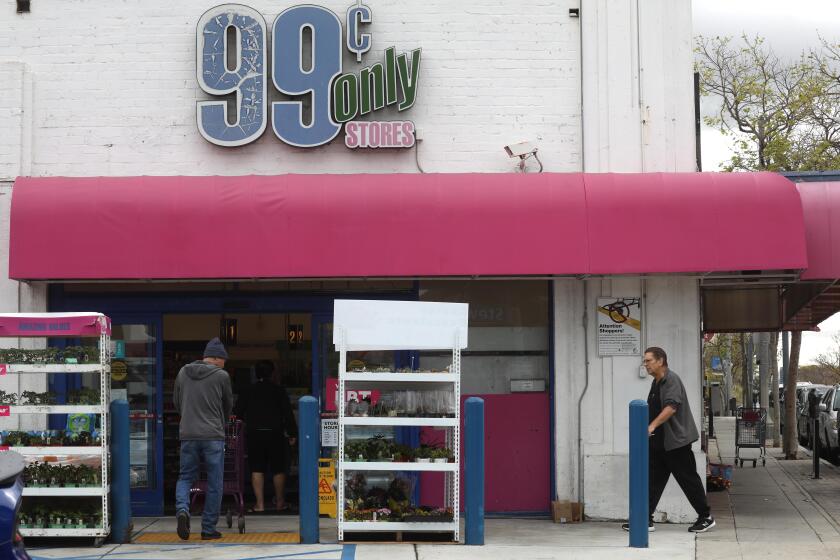Sam Ash, iconic retailer to musicians, plays its last notes

- Share via
Kristina Bialkowski remembers the day she got her first guitar at the Sam Ash Music Store on Sunset Boulevard in Hollywood.
She was 10 and her father, who had started teaching her to play the instrument, took her into the shop down the street from their home to browse.
The deep-discount retailer started in L.A. in 1982 and grew to 371 stores. Now all are closing, with rising crime, competition, inflation and the pandemic contributing to the company’s fall.
Now a musician who sometimes plays alongside the singer Geia, Bialkowski recalled staring up at the menagerie of instruments on the wall and feeling elated when she made her choice: a black, electric Fender.
She returned through the years to buy a synthesizer and a bass and, in high school, to hang out with friends, so she felt stunned recently when she drove by and saw a sign announcing that the shop — along with all the other locations in the iconic music chain that grew from a single store in Brooklyn into a nationwide business behemoth — would soon close down.
“No way!” thought Bialkowski, 29, who works in music marketing and also posts covers of songs on Instagram and TikTok. But then she thought back to her recent trips to the shop and how much less busy it had looked than when she was a young girl.
“I guess it makes sense,” she said. “No one really buys instruments anymore. Everyone is a DJ or they’re buying online.”
The company announced the imminent closure of all its locations — including stores in San Diego, Westminster, Torrance, Ontario and Industry — in a post on Instagram this week, saying it had made the decision with “a heavy heart.”
“Thank you,” it read, “for allowing us to serve musicians like you for 100 years.”
The company was founded in Brooklyn in 1924 by Sam and Rose Ashkynase, a young couple who both immigrated to the U.S. as children, he from Austria and she from Russia.
To cover the down payment on the small shop, they pawned Rose’s $400 engagement ring. They managed to stay open through the lean years of the Great Depression, according to a biography on the company’s website.
As it grew through the decades, expanding to other parts of New York and then across the nation, the company stayed in the family — run, at times, by the couple’s sons, grandsons and eventually their great-grandchildren. While Sam died in the mid-1950s, Rose continued to work until she was 80.
In 1998, as the company prepared for a big expansion into the Southland, The Times chronicled how the chain’s growth might hurt independent music stores in the region.
Paul Ash, one of the founders’ sons, who was president of the company at the time, brushed off such concerns, saying, “We feel that we expand a market, not shrink it.”
In a brief history on the company’s website, they describe their story as the quintessential American Dream and discuss “retaining the basic concepts of a family-run business even today.”
“The Sam Ash saga,” it reads, “is a classic business story.”
Indeed, the company’s decision to close all of its retail locations is part of one of the most defining business stories of the modern era, in which bricks-and-mortar stores have struggled to compete with online commerce.
In recent months, several other companies, including Macy’s, REI and 99 Cents Only, have announced plans to close locations in Southern California.
In a written statement, Derek Ash, one of the founders’ great-grandsons, declined to answer a question about why the stores were closing but confirmed that some locations would shutter by the end of the month and others would have sales going through mid-July.
He wrote that the family will always cherish memories of creating a space where many musicians tried out new instruments for the first time or met future band members. Over four generations, he said, they “had the privilege to watch the evolution of music in America.”
For Michael Gallant, who worked at the chain’s location in City of Industry for a few months in 2010, the job provided a critical sense of community that lasted far longer than the gig itself.
The 48-year-old musician — who has performed for years as a member of several Beatles tribute bands and will tell you, with a laugh, that “I’m the Paul McCartney guy” — said he has maintained friendships with several other Sam Ash employees and still cherishes memories of meeting customers.
When he recently heard about the closures through the grapevine, he said he felt bummed but not surprised.
“It certainly sucks,” he said. “But I saw the writing on the wall, mainly ’cause of the internet.”
More to Read
Inside the business of entertainment
The Wide Shot brings you news, analysis and insights on everything from streaming wars to production — and what it all means for the future.
You may occasionally receive promotional content from the Los Angeles Times.












